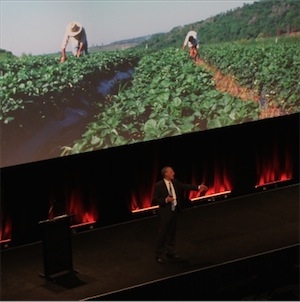We've had a global financial crisis but we now have an upcoming global food crisis and only innovation and technology that will avert it, says Berry Marttin, Rabobank Group Netherlands executive board member.
The so-called Arab Spring was kicked off by growing food prices and shortages which started with drought.
Agriculture needs to have its input into the G20 in Brisbane this week as he had just travelled round the world to various leaders meetings including G8 and there were no farmers at the table. Leaders were talking about food production and security and the people who have to do it were not at the table.
He was speaking at the Rabobank F20 Summit in Sydney Australia today which brought together farmers, agribusiness, academics and other associated with the agriculture from 20 countries to discuss global food security challenges to offer solutions ahead of the G20 summit in Brisbane this week.
Marttin told the conference that the countries with the best soils in the world were not the highest producers. "Farming is about creating the right environment so it can prosper," he says.
The was about enabling good government policies, access to finance, technology, innovation and education – that is what makes the real difference to farming activity.
The US, Europe, South America, Australia and New Zealand were the biggest producers of excess food – but average age of farmers was 55. The farming industry has not been doing good story telling promoting itself, and that included agricultural schools.
A global survey by Rabobank of farmers showed a key issue was being able to attract the best young people. "If you are bright and have ideas on thing you would not do is go and work for the farm," he said. Yet farming may offer the challenges they were looking for – managing people, managing systems and use of exciting equipment and technology.
"The image is just wrong," Half of the farmers "did not have the guts" to discuss succession with their family. With sustainability, farmers were not against it, it was how to do it.
By 2050 we must double the world food production – because of population growth and a growing middle class, Marttin says. The world population is growing the size of the city of Hong Kong every month, mostly in emerging markets where there are deficiencies in food production. The Arab Spring was kicked off by growing food prices and shortages following drought.
Every year we lose 1% of global land to urbanisation, erosion and other factors. Every 20 years the dependency on one farmer is doubling, we only have 0.8 ha of farm land per head of population – we are heading toward 0.5ha whereas in the 60s we had 1.2ha.
The interesting part for agriculture is the 1 billion upcoming middle class is in Asia. "You are located in the place where most of the action is going to happen in food consumption in the next 40 years," he told the Australian conference.
Some key issues for farmers for the required doubling of food production were:
· Sharing of knowledge and science will be very important. There had not been a major breakthrough in farming management systems in the last few years.
· We need a better connection between farmers globally. Socially enabling factors are a key.
· Producing products designed to meet what the consumer wants to buy
· The industry will have to change to just-in-time supply.
The Netherlands and Japan have similar land yet the Netherlands is the second biggest producer of food in the world and Japan is the biggest importer.
Marttin says mid-west US, Argentina and the Ukraine have the best soils in the world. Yet the yield in those regions in those regions is not high – the three best yields are in west Europe – not known for its good soil and climate. Netherlands has the highest productivity per hectare in the world and a lot of the land has been reclaimed from the sea. Africa has some of the best soils and lowest productivity.
Leaders in the world had to come together to assist farming and help some countries get out of their gridlock of production.
Doubling production without more resources will only come through innovation. Genetics and precision farming held some of the answers.
"We need to get inspired to tell our global leaders about what will make a difference," he said.



















